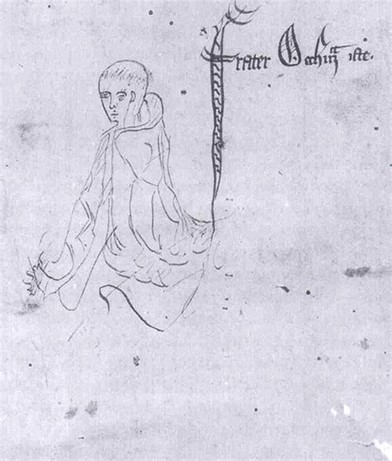A few thoughts on a new essay
I have long thought that we are living in times of upheaval that can only be compared to the great plague epidemics of the 14th century, roughly from 1345 to 1349. At that time, the orderly world of the High Middle Ages collapsed. William of Ockham (Illustration: portrait sketch of William Ockham, probably one of the first portraits of a philosopher, from an Oxford manuscript [1]) dismantled with his critique the edifice of High Scholasticism as it had been built up by Albertus Magnus, Thomas Aquinas, or Bonaventure and others (I have presented this in somewhat more detail in my little introductory textbook [2]).
In brief: Thomas Aquinas, in particular, had developed a very rational worldview, based on Aristotle, in which Christian theology was well embedded. From Ockham’s point of view – who was a Franciscan and wanted to promote Franciscan piety – it had a decisive disadvantage: it distanced the soul from a direct contact with God. For in the Thomasian-Aristotelian view there was no direct knowledge of God, only an indirect one, and all that could be learned about the world was mediated through abstractions. The price of the medieval cosmos and its security was thus an insertion of the individual into a system of hierarchies and dependencies, politically as well as philosophically and theologically. It was mainly Franciscan scholars who revolted against this, and among them Ockham was the most profiled, eloquent and influential (a good detailed exposition of all these issues at [3]). For they wanted one thing above all: to secure direct access of the soul to God, conceptually-theologically and practically.

